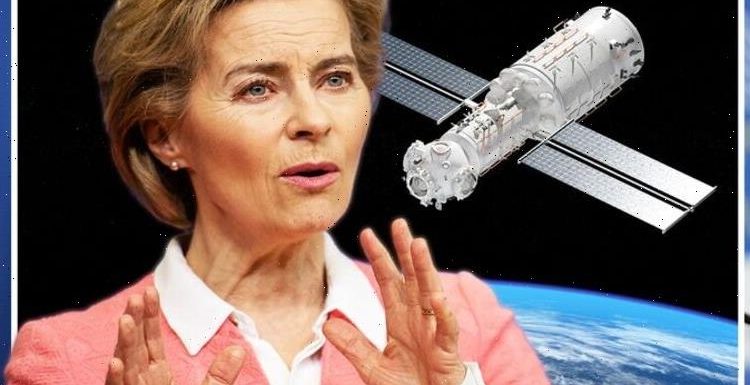
SpaceX launches batch of Starlink satellites with Falcon 9
We use your sign-up to provide content in ways you’ve consented to and to improve our understanding of you. This may include adverts from us and 3rd parties based on our understanding. You can unsubscribe at any time. More info
The EU Commission pitched its plan, which looks to boost internet access across the continent and provide a boost to the bloc’s secret communications network. This system will plan to rival Elon Musk’s Starlink satellite network and the UK’s OneWeb constellation. It will also improve existing EU space schemes by adding a third network to Galileo and Copernicus, which respectively provide global navigation and earth observation coverage.
Thierry Breton, the EU’s Commissioner for the internal market, stressed that space was now playing an increasingly important role in people’s everyday lives and nation’s economic growth, security and geopolitical clout.
He added: “Our new connectivity infrastructure will deliver high-speed internet access, serve as a back-up to our current internet infrastructure, increase our resilience and cyber security, and provide connectivity to the whole of Europe and Africa.
“It will be a truly pan-European project allowing our many start-ups and Europe as a whole to be at the forefront of technological innovation.”
He noted that at present, only 56 percent of households in the bloc have access to high-speed broadband connections.


Mr Breton added: “[Our project] represents what we need to be doing as a Continent which is increasingly aware of its geopolitical responsibilities.”
Mr Breton predicts that the development of this system could commence next year with its first service and quantum cryptography testing by 2025.
He noted that the entire constellation could be ready for use by 2028, which is nearly six years after Britain’s OneWeb is expected to launch full global services.
It is important to note that the plan is still a proposal and is subject to discussions by EU countries and in the European Parliament.

If it’s approved, this would be the bloc’s third major satellite programme, after Galileo and Copernicus.
The Galileo satellite system is an £8billion navigation project intended to rival the US-controlled Global Positioning System (GPS).
The UK was barred from the Galileo project following its departure from the EU.
The new satellite system will also be crucial for the bloc cyber security goals, after foreign ministries and diplomatic services across the continent have faced several waves of cyberattacks that were linked to Russian hackers.
DON’T MISS:
Call for tougher rules as new variant may be ‘more lethal’ [SPOTLIGHT]
Putin to hit back and cut THREE key exports to West [HIGHLIGHT]
China faces crisis after ‘alarming’ children’s heart discovery [REVEAL]

Stressing the importance of the OneWeb system for the UK, Science Minister George Freeman tweeted: “As reliance on satellites for everyday comms increases, the global race for LEO satellite networks (& the vital spectrum licenses on which to operate) hots up.
“That’s why the UK OneWeb network is so key.
“Now EU pitches a broadband satellite plan.”
This comes as OneWeb launched 34 more satellites into orbit last week as it continues to boost its network.
The UK-based company is already halfway through deploying around 650 LEO broadband satellites and SpaceX’s LEO constellation Starlink is even further ahead with more than 1,600 satellites estimated to be in orbit.

Technology expert Simon Baker previously noted: “No region has more to lose from the rise of Elon Musk in space than Europe. Its Arianespace is one of the launch providers which has lost out to SpaceX.
“Currently, Europe is a global leader in satellite operation, as home to the headquarters of three of the major players: Eutelsat, SES and Inmarsat.
“The European geostationary operators, with big investments in capacity in orbit that they can now do nothing to change, are looking vulnerable, and need to respond.”
Source: Read Full Article